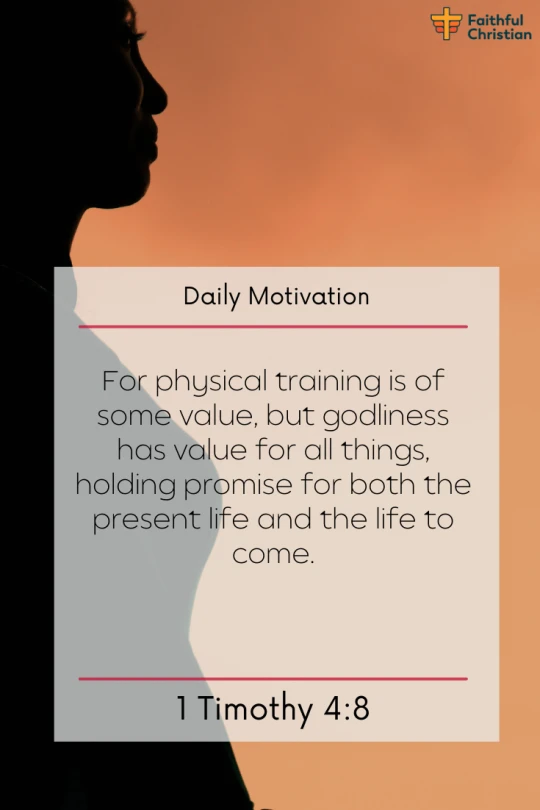Finding true contentment can be an elusive quest.
Yet, in our spiritual journey, it’s a key ingredient for unlocking deeper connections with God and experiencing salvation.
Worldly success often distracts us from our main goal: to serve God wholeheartedly.
Christians should shift focus from material possessions to nurturing spiritual well-being and prioritize what truly matters.
A pastor once said, “If you’re not rich, you haven’t experienced God’s blessings fully.”
This couldn’t be more misleading. God’s blessings are abundant and manifest in countless ways.
Think about the simple things: waking up each morning, overcoming illness, or enjoying a nourishing meal.
It’s natural to desire additional blessings, like financial prosperity.
However, the key is to remain content even when our prayers aren’t immediately answered.
Finding contentment amidst life’s challenges can be tough, especially when others around us seem to thrive.
That’s where “Bible verses about being content with who you are” offer much-needed reassurance.
In this article, we’ve gathered a collection of Bible verses about contentment and happiness to inspire and uplift you.
These passages will remind you of God’s infinite love and His incredible plans for you.
So, Let us explore the power of gratitude, fulfillment, and unwavering faith.
Let these verses guide you toward a life of true contentment.
Recommended for you
- You Reap What You Sow: Meaning
- This Is The Day That The Lord Has Made: 5 bible verses
- Powerful Short prayers for happiness
- Prayer For contentment with Who you are
Bible verses about contentment and happiness

1. Proverbs 19:23

The fear of the Lord leads to life;
then one rests content, untouched by trouble.
Are you on a quest for peace and contentment? You’re not alone. Many of us yearn for happiness and satisfaction in today’s fast-paced world.
Thankfully, the Bible provides timeless wisdom on this topic, particularly in the book of Proverbs.
Let’s delve into Proverbs 19:23 and uncover the secret to true contentment and satisfaction.
Several vital principles in Proverbs 19:23 can guide us towards the contentment we seek. Firstly, the verse reveals that contentment leads to peace and rest.
As we find fulfillment in our relationship with God and follow His path, we experience profound well-being and tranquility.
Proverbs 14:30 reinforces this, stating, “A heart at peace gives life to the body, but envy rots the bones.”
Additionally, Proverbs 19:23 emphasizes the value of fearing the Lord in our search for contentment. Fearing the Lord means holding Him in reverence and awe, acknowledging His power and authority in our lives.
This reverential fear motivates us to obey His commandments and walk in His ways, ultimately leading us to the satisfaction we crave.
Proverbs 17:1 captures this sentiment, saying, “Better a dry crust with peace and quiet than a house full of feasting, with strife.”
While the world convinces us that material possessions bring happiness and contentment, the Bible teaches that true satisfaction comes from God. Seeking Him and His righteousness fulfills our deepest desires.
Paul’s life illustrates this principle, as he states in Philippians 4:11-13, “I have learned in whatever situation I am to be content. I know how to be brought low, and I know how to abound…I can do all things through him who strengthens me.”
Choosing a life aligned with God’s will and principles results in contentment and satisfaction. Although challenges may still arise, we find peace in knowing we are at the center of God’s will.
Ultimately, genuine contentment removes anxiety and unrest from our lives. When we are content with what we have and trust God to provide, we can let go of worry and embrace the peace that surpasses understanding.
The minimalist lifestyle movement exemplifies this principle in modern times. Many people find that by simplifying their lives, they can focus on what truly matters and experience greater contentment.
By shedding material possessions, they find satisfaction in relationships, experiences, and personal growth. This demonstrates that true contentment doesn’t come from what we own but who we are and how we live.
In summary, Proverbs 19:23 imparts valuable wisdom on finding contentment and satisfaction. By fearing the Lord, prioritizing Him above all else, and living a righteous life, we can attain the peace and rest our hearts desire.
2. Hebrews 13:5-6

5 Keep your lives free from the love of money and be content with what you have, because God has said, “Never will I leave you; never will I forsake you.” 6 So we say with confidence, “The Lord is my helper; I will not be afraid. What can mere mortals do to me?”
In a world that urges us to chase more, finding true contentment can be daunting. Yet, the Bible guides us on this journey.
Hebrews 13:5-6 emphasizes trusting in God’s presence, promises, and provision, while letting go of our love for money.
Navigating life’s complexities, trusting in God’s presence and promises is crucial for contentment. Deuteronomy 31:6 reinforces this, assuring us that God will never abandon us.
By placing our faith in God, we can overcome anxiety and uncertainty.
Money and possessions often bring stress and dissatisfaction. Hebrews 13:5-6 reveals that contentment comes from trusting God’s provision, not accumulating wealth.
By shifting our focus from material goods, we can find joy and peace in what truly matters – our relationship with God and others.
Scripture is filled with examples of God’s provision and protection for His people. One such example is the Israelites’ journey through the wilderness after leaving Egypt.
Despite challenging circumstances, God consistently provided for their needs, giving them food, water, and shelter.
This story is a powerful reminder that we can also rely on God’s provision in our lives, even during difficult situations.
When facing struggles, it’s tempting to rely on our own abilities. However, Psalm 118:6 advises us to trust in the Lord over ourselves.
Acknowledging our limitations and seeking God’s help allows us to experience transcendent contentment.
God’s unwavering presence offers a powerful sense of contentment. Knowing that God is by our side, in good and bad times, brings peace and stability.
This knowledge comforts us in challenging seasons, when we may feel overwhelmed or uncertain.
In modern times, we find inspiration in stories of people who’ve left lucrative careers to pursue their passions or help others.
These individuals often discover deeper contentment and purpose by aligning their lives with their values and dedicating themselves to making a positive impact.
By prioritizing their relationship with God and others’ well-being over material success, they experience profound satisfaction and fulfillment.
To conclude, Scriptures on Contentment and Trusting in God’s Provision teach us valuable lessons for a contented life.
By focusing on our relationship with God, relinquishing the love of money, and trusting in His provision, we can find enduring contentment.
Embracing these principles, we can live with deep peace and joy, grounded in what truly matters.
Relying on God’s strength and presence, we can confidently tackle life’s challenges, secure in the knowledge that He will never leave us nor forsake us.
3. Matthew 5:6

Blessed are those who hunger and thirst for righteousness,
for they will be filled.
In search of a more fulfilling life, have you ever felt a void that material possessions and achievements can’t fill? The secret to true satisfaction might lie elsewhere.
The message in Matthew 5:6 highlights the importance of seeking righteousness and a deeper relationship with God, which can lead us to spiritual fulfillment and true contentment in life.
Craving righteousness means having a strong desire for a right relationship with God. Our souls, like our bodies, require spiritual nourishment.
Psalm 63:1 beautifully captures this idea: “O God, you are my God; earnestly I seek you; my soul thirsts for you.” When we intensely pursue God, we embark on a journey toward spiritual fulfillment.
Matthew 5:6 is part of the Beatitudes, teachings Jesus shared during the Sermon on the Mount. These teachings emphasize the need to prioritize God’s kingdom.
Jesus further asserts in Matthew 6:33, “Seek first the kingdom of God and his righteousness.” By focusing on God, we find contentment beyond earthly concerns.
A true hunger for righteousness fuels our spiritual journey and pushes us toward growth and satisfaction. As food sustains our bodies, our souls need spiritual sustenance.
Psalm 107:9 describes the contentment we find in God: “He satisfies the longing soul, and the hungry soul he fills with good things.” By staying spiritually hungry, we continuously draw closer to God.
Pursuing righteousness not only brings spiritual satisfaction but also adds to our overall happiness.
When we align our lives with God’s will, we begin to experience true contentment. This life approach may be challenging, but the rewards are worth it.
In today’s fast-paced world, material success and earthly pleasures often dominate our thoughts. However, these pursuits bring fleeting satisfaction. In contrast, a righteous life leads to lasting contentment, even in tough times.
The Beatitudes and the Sermon on the Mount offer a blueprint for a fulfilling life. Following these teachings, we develop a deeper relationship with God and find true contentment.
Countless people have prioritized spiritual growth and service to others over material success.
For example, Mother Teresa devoted her life to serving the poor, finding immense joy in her work. Many others have discovered that focusing on spiritual growth and service creates a deeply satisfying life.
In conclusion, Matthew 5:6 sends a powerful message to those seeking true contentment and spiritual satisfaction.
By craving righteousness, prioritizing God’s kingdom, and maintaining spiritual hunger, we set off on a journey toward lasting happiness.
The Beatitudes and the Sermon on the Mount, along with modern examples, remind us that true contentment is rooted in our relationship with God and pursuing a righteous life.
As we embrace Matthew 5:6 and strive to align with God’s will, we can experience the deep satisfaction that comes from a life centered on spiritual growth and service.
Let’s remember Psalm 107:9, “He satisfies the longing soul, and the hungry soul he fills with good things,” and strive to nourish our souls by seeking God’s presence and living a righteous life.
4. 1 Timothy 4:8

For physical training is of some value, but godliness has value for all things, holding promise for both the present life and the life to come.
Seeking contentment in a world fixated on material success is tough. Yet, the Bible tells us true satisfaction comes from godliness and spiritual well-being.
1 Timothy 4:8 highlights that while physical training has some value, godliness is valuable for all things, both in this life and the next. Let’s explore how godliness and contentment intertwine, leading to a fulfilling life.
By focusing on godliness, we find contentment in our lives, regardless of circumstances. Proverbs 3:7-8 teaches us to be humble, fear the Lord, and avoid evil.
Doing so brings health and nourishment. A deep relationship with God and adherence to His commandments lead to genuine satisfaction and peace.
Although physical health matters, the Bible underscores spiritual health. Proverbs 4:22 says God’s words are life and health to those who find them.
Prioritizing spiritual well-being helps develop an eternal perspective and a deeper sense of contentment.
In a materialistic world, we must remember that true fulfillment stems from a godly life. As our relationship with God grows and we embrace His values, we can experience authentic contentment transcending circumstances.
Cultivating spiritual discipline is vital for contentment. Prayer, Bible study, worship, and service are crucial for nurturing our connection with God.
Through spiritual discipline, a contented heart rooted in God’s love and presence emerges.
Balancing physical and spiritual well-being is key for true contentment. While caring for our bodies is important, we must prioritize spiritual growth. This balance brings a harmonious sense of satisfaction and peace.
Daniel’s story in the Bible illustrates godliness and contentment. Despite being captives in Babylon, Daniel and his friends remained faithful, prioritizing spiritual well-being.
Their godliness brought God’s favor and protection, showcasing a contented heart rooted in faith.
Today, athletes like Tim Tebow and Allyson Felix prioritize faith and values over material success. Amidst pressure and expectations, they openly share their faith and commitment to godliness.
Their lives exemplify contentment found in prioritizing spiritual well-being.
Pursuing godliness and spiritual health leads to true contentment beyond material possessions and worldly success.
By cultivating a deep relationship with God and prioritizing spiritual well-being, we find lasting satisfaction and peace. Embrace the Scriptures on godliness and contentment to experience the fullness of life God has for you.
5. Philippians 4:11-12

I am not saying this because I am in need, for I have learned to be content whatever the circumstances.

I know what it is to be in need, and I know what it is to have plenty. I have learned the secret of being content in any and every situation, whether well fed or hungry, whether living in plenty or in want.
Discovering the secret to contentment can transform our lives. Philippians 4:11-12 offers us valuable insights. In these verses, the apostle Paul shares his own experience. Let’s dive deeper into this essential lesson.
Paul reveals his secret to contentment. He has learned to be content in every situation. It’s not about what we have or lack. It’s about cultivating an attitude that transcends circumstances.
External circumstances don’t define contentment. Many people chase money, better jobs, or ideal relationships. But true contentment comes from within. It’s a mindset that embraces peace and joy in any situation.
Gratitude plays a vital role. By focusing on blessings, we develop satisfaction and fulfillment. Paul urges us to give thanks in all circumstances (1 Thessalonians 5:18). Gratitude shifts our focus from lack to abundance.
Christ’s strength enables us to face all situations with contentment. In 2 Corinthians 12:10, Paul shares his secret: “For when I am weak, then I am strong.” Faith in Christ has the power to transform our attitude in any challenge.
Adapting to different circumstances is crucial. Life is full of changes. Learning to navigate them with grace and resilience is key. Flexibility and adaptability help us find joy in unpredictability.
Paul’s life and missionary journeys are great examples. He faced trials, like shipwrecks and imprisonment. Yet, he remained committed and content. His faith and reliance on Christ’s strength sustained him.
In modern times, we see people facing adversity with positivity and gratitude. They focus on what they have, not on what they lack. They remind us that contentment isn’t about external circumstances.
In conclusion, contentment comes from gratitude, Christ’s strength, and adaptability. Embracing these principles leads to a fulfilling, joyful life. So, let’s learn from the Bible and cultivate contentment in our hearts.
6. 1 Timothy 6:6-11

But godliness with contentment is great gain. 7 For we brought nothing into the world, and we can take nothing out of it. 8 But if we have food and clothing, we will be content with that.

9 Those who want to get rich fall into temptation and a trap and into many foolish and harmful desires that plunge people into ruin and destruction.

10 For the love of money is a root of all kinds of evil. Some people, eager for money, have wandered from the faith and pierced themselves with many griefs..
In our world, where material possessions are often glorified, it’s tempting to focus on wealth and belongings. Yet, the Bible teaches us that true contentment is found in a life focused on spirituality.
The passage 1 Timothy 6:6-11 provides valuable insights on how to achieve this contentment and avoid the pitfalls of materialism.
Paul’s simple yet profound message is that godliness with contentment is a great treasure. By prioritizing spiritual virtues such as righteousness, faith, love, endurance, and gentleness, we can find lasting contentment.
This focus on spirituality is a key to unlocking true happiness.
Luke 12:15 cautions us against greed, reminding us that life is not measured by possessions. Likewise, Ecclesiastes 5:10 warns that the love of money can lead to insatiable desires.
These verses emphasize the need to avoid materialism, which can trap us in a cycle of discontent.
The story of the rich young ruler in Matthew 19:16-22 illustrates the dangers of materialism. Although wealthy, he sought eternal life, but couldn’t part with his riches when Jesus asked him to.
This account highlights how the love of money can obstruct our spiritual growth and contentment.
To foster contentment, we must recognize the fleeting nature of wealth and possessions.
By shifting our focus from materialism to spiritual values, we uncover true contentment rooted in our relationship with God and the virtues we nurture.
In conclusion, the Bible offers invaluable wisdom on attaining contentment by steering clear of materialism.
By centering our lives on spirituality and learning from biblical and modern examples, we can cultivate a deep sense of contentment that transcends our circumstances and enriches our lives.
7. Isaiah 58:10-11

and if you spend yourselves in behalf of the hungry
and satisfy the needs of the oppressed,
then your light will rise in the darkness,
and your night will become like the noonday.
11 The Lord will guide you always;
he will satisfy your needs in a sun-scorched land
and will strengthen your frame.
You will be like a well-watered garden,
like a spring whose waters never fail.
Isaiah 58:10-11 teaches us about the joy of helping others. It’s a powerful message that can bring contentment into our lives.
Let’s dive deep into this theme and see how other scriptures, like Proverbs 11:25 and Proverbs 19:17, support this idea.
First, Isaiah 58:10-11 tells us to find contentment in service. When we help the hungry and the oppressed, our lives become brighter.
Proverbs 11:25 echoes this, saying that a generous person will prosper. By meeting others’ needs, we experience fulfillment.
Generosity and compassion bring blessings. When we show kindness and empathy, God rewards us.
Proverbs 19:17 says that being kind to the poor is like lending to the Lord. Our acts of compassion lead to contentment and satisfaction.
God guides and provides when we care for those in need. Isaiah 58:11 promises that the Lord will meet our needs, making us strong and vibrant. We can trust Him as we reach out to help others.
Selflessness leads to joy and satisfaction. When we focus on others instead of ourselves, we find true happiness. We start to understand the value of service and feel content.
The Good Samaritan’s story in Luke 10:25-37 is an excellent example. He helped a stranger in need without hesitation. His selfless act saved a life and brought him joy.
In today’s world, we see examples in philanthropists and volunteers. They dedicate time and resources to improve lives. They find purpose and joy in serving others. This selfless giving leads to a deep sense of satisfaction.
In conclusion, Isaiah 58:10-11 and supporting scriptures emphasize the importance of helping others. By serving, we receive blessings, guidance, and joy.
Let’s strive to live our lives in service, embracing the contentment that comes from making a difference.
8. Psalm 119:36-37

Turn my heart toward your statutes
and not toward selfish gain.
37 Turn my eyes away from worthless things;
preserve my life according to your word.[a]
Are you searching for contentment and happiness in life? The Bible holds the answer, specifically in Psalm 119:36-37.
In this passage, the psalmist seeks a heart attuned to God’s commandments and requests help to avoid life’s empty distractions. Let’s discover how this scripture can guide us towards true happiness.
Embracing God’s commandments is the first step towards genuine contentment. When we sincerely love and follow God’s Word, our lives become rich with purpose.
This bond with our Creator establishes a solid foundation for enduring happiness.
Our world is rife with distractions and fleeting pleasures that can lead us off course. Focusing on eternal values like God’s love, grace, and wisdom helps maintain contentment, even amid constant change.
By centering on what truly matters, we find profound fulfillment.
God’s Word is an invaluable source of wisdom, offering guidance, strength, and solace. Immersing ourselves in Scripture, we come to understand God’s immense love and His plan for us.
This pursuit of wisdom fosters contentment and happiness beyond worldly offerings.
Colossians 3:2 and 1 John 2:15-17 reinforce the need to fix our thoughts on heavenly things and avoid worldly love. By seeking divine wisdom and concentrating on eternal matters, we discover true happiness and contentment.
Worldly desires can be tempting but often result in disappointment and emptiness. As our faith grows, we learn to resist these temptations and find fulfillment in God’s promises.
This resistance allows us to enjoy the contentment arising from a life aligned with God’s will.
Finally, we must prioritize God’s kingdom over acquiring material possessions and indulging in transient pleasures. Focusing on God’s realm ensures our needs are met, and our hearts are satisfied.
King David, a man after God’s own heart, exemplifies finding contentment through devotion to God and His Word.
Despite numerous challenges, David consistently sought divine guidance and comfort in Scripture. This steadfast commitment laid the groundwork for his lasting contentment and happiness.
In summary, Psalm 119:36-37 teaches us that true contentment and happiness stem from embracing God’s commandments, concentrating on eternal values, pursuing His Word and wisdom, resisting worldly desires, and prioritizing divine matters over earthly pursuits.
By adhering to these principles, we can experience the profound fulfillment and joy that result from a life grounded in God’s love and wisdom.
9. Proverbs 16:16

How much better to get wisdom than gold,
to get insight rather than silver!
In our materialistic world, many people chase wealth and possessions. However, the Bible offers a different perspective on finding contentment.
Proverbs 16:16 states, “How much better to get wisdom than gold, to get insight rather than silver!” By valuing wisdom and understanding, we can uncover a deeper sense of contentment.
Firstly, Proverbs 16:16 emphasizes the value of wisdom over wealth. Society often measures success by financial means, but this verse reminds us that true riches lie in wisdom.
When we choose to seek wisdom, we invest in an everlasting asset. In contrast, material possessions can be fleeting and lead to dissatisfaction.
True contentment stems from seeking wisdom. Wisdom fosters a deeper connection with ourselves, others, and the world. This connection helps us handle life’s challenges with grace and resilience.
Contentment achieved through wisdom is something that material wealth cannot provide.
Furthermore, wisdom leads to a fulfilling life by guiding our actions and decisions. Gaining wisdom helps us discern what matters, enabling us to prioritize our lives.
This clarity of purpose allows us to make choices that align with our values, leading to a more satisfying and meaningful life.
By seeking wisdom, we prioritize spiritual growth over material success. This shift in focus creates a more balanced life. Nurturing our spiritual well-being cultivates inner contentment that withstands external circumstances.
Lastly, wisdom’s lasting impact is evident in how it enriches our relationships, decision-making, and overall life satisfaction.
Wisdom provides tools to navigate life’s complexities with grace, leading to a deeper sense of purpose and fulfillment.
The story of Solomon in 1 Kings 3:5-14 highlights the importance of valuing wisdom over material possessions. When offered anything from God, Solomon requested wisdom to govern his people justly.
As a result, God granted him exceptional wisdom, wealth, and honor.
In modern times, examples of individuals who prioritize wisdom through education and personal development can be found.
They invest time and energy into expanding their knowledge and skills to make a positive impact. Their pursuit of wisdom enables them to experience deeper contentment and fulfillment.
In conclusion, Proverbs 16:16 teaches us that wisdom and understanding hold greater value than material wealth.
By seeking wisdom, prioritizing spiritual growth, and recognizing wisdom’s lasting impact, we can experience profound contentment.
Embracing these lessons can lead to a more fulfilling and satisfying life, rich in purpose and meaning.
10. Matthew 6:25-26
25 “Therefore I tell you, do not worry about your life, what you will eat or drink; or about your body, what you will wear. Is not life more than food, and the body more than clothes? 26 Look at the birds of the air; they do not sow or reap or store away in barns, and yet your heavenly Father feeds them. Are you not much more valuable than they?
In a world full of uncertainties, contentment can seem elusive. However, the Bible offers valuable guidance on finding true contentment by trusting in God’s care.
Matthew 6:25-26 is a pivotal passage on this topic, where Jesus teaches us not to worry about our needs.
Here, we’ll explore the wisdom of these verses and learn how to experience contentment through trust in God’s provision.
During his Sermon on the Mount, Jesus addresses our tendency to worry about life’s necessities. He highlights the futility of anxiety, reminding us that our Heavenly Father knows and cares for our needs.
Jesus uses birds as an example. They don’t sow, reap or store food, yet God provides for them. If God cares for the birds, how much more will He care for us, His children?
Trusting God as our provider brings contentment. It allows us to let go of control and acknowledge that our lives are in His hands.
Trusting in His care helps us focus on the present moment and live without anxiety for the future. This contentment frees us from worry and allows us to experience peace beyond understanding.
The Bible reinforces this message in passages like Psalm 55:22 and 1 Peter 5:7.
Both verses encourage us to cast our cares upon the Lord because He cares for us. These scriptures remind us that God is not only aware of our needs but actively involved in providing for them.
A powerful biblical example is Jesus feeding the multitude in Matthew 14:13-21. Jesus miraculously multiplies five loaves and two fish to feed over five thousand people.
This miracle shows God’s ability to provide, even in seemingly impossible situations. Trusting in God’s care and provision leads to contentment, knowing He will meet our needs.
In modern times, many individuals choose to trust in God’s provision, focusing on the present moment rather than worrying about the future. They find contentment in simple things, embracing gratitude and faith.
Their lives serve as a testament to the power of trusting in God’s care, showing that contentment can be found when we rely on His provision.
In conclusion, the Bible verses on contentment, particularly Matthew 6:25-26, offer valuable wisdom for finding peace and satisfaction.
Recognizing the futility of worrying, placing our faith in God’s provision, and living in the present moment help us discover true contentment.
As we learn to trust God more deeply, we can experience the joy and peace that come from knowing He cares for us and will provide for our needs.
Recommended for you
- You Reap What You Sow: Meaning
- This Is The Day That The Lord Has Made: 5 bible verses
- Powerful Short prayers for happiness
- Prayer For contentment with Who you are
More scriptures about being content
11. Proverbs 15:16
12. 2 Timothy 3:2
13. Ecclesiastes 5:10-16
14. Colossians 3:5
15. Psalm 62:10
16. Philippians 4:19
17. 2 Corinthians 9:8-11
18. Psalm 84:11
19. 1 Timothy 6:17
20. Deuteronomy 8:3-4
Recommended for you
- 10 Powerful scriptures for happiness
- 33 Do not love Money Scriptures
- Bible Verses about Money and Selfishness: Important Scriptures
- 32 Bible verses about loving your body: Powerful Scriptures
Embrace Contentment in Your Life (Inspiring Words of Encouragement)
-
God understands your challenges
We often dream of luxurious cars and exquisite homes. While these desires may provide physical comfort, do they nurture our souls?
Always remember, God has a superior plan for us. Money, known as the root of all evil, is something God is mindful of.
If wealth could lead you astray, why would He grant something that may destroy you? He wouldn’t.
God desires that you flourish and be saved in the end. He is aware of a heavenly paradise where all your needs will be met through His grace.
In this paradise, nothing will be lacking. In essence, your desires are temporary, and God will fulfill them in His kingdom.
-
Pray without losing heart
Being content doesn’t mean you can’t share your desires with God.
If you need a new car or job, communicate with God through prayer. Contentment also doesn’t imply passively accepting life’s challenges.
Instead, it means staying patient and serving God even after seeking His help. So, kneel and pray for a financial breakthrough, but be cautious with your intentions.
Prayers lacking scriptural understanding may not be answered.
Let your prayer be guided by love for God and those around you. In turn, He will act and bless you with abundant goodness.
A Prayer for Discovering Peace and Contentment
Dear Heavenly Father,
In these challenging times, our desires seem boundless.
The devil tempts us to forsake our trust in You.
Yet, we know You love us and desire our well-being. Your Word states, “No harm overtakes the righteous.” Guide our hearts and those of our families during these difficult times.
Protect us from the devil’s traps and grant us peace.
Provide for our needs and give us grace to continue serving You.
Forgive our sins and let them not hinder our heavenly blessings.
Bless us spiritually and materially according to Your will.
Above all, instill in us a heart that finds contentment in all things.
We ask all these through Jesus Christ, our Lord. Amen.
Frequently asked questions
What does the Bible say about being content with yourself?
The Bible encourages us to find contentment within our relationship with God, rather than seeking it through external factors or material possessions.
In Philippians 4:11-12, Paul shares his journey of discovering contentment in various situations.
The secret to being content with ourselves lies in recognizing our worth and identity in Christ, knowing that we are loved, valued, and created in God’s image (Genesis 1:27, Ephesians 2:10).
What does the Bible say about being satisfied with what you have?
Scripture teaches us to be satisfied with what we have, focusing on God’s faithful provision instead of constantly striving for more.
Hebrews 13:5-6 reminds us to be content with our possessions and to trust in God’s unending presence and care.
This message is echoed in 1 Timothy 6:6-8, where godliness with contentment is considered great gain, and we are encouraged to be satisfied with life’s essentials.
How can I be content with what God has given me?
To find contentment in what God has given us, we need to cultivate gratitude and trust in His wisdom and care.
Appreciating the blessings we have, both big and small, is crucial for contentment.
Proverbs 3:5-6 encourages us to trust in the Lord wholeheartedly and not rely on our understanding, knowing that He directs our paths and provides for our needs.
What is the best Bible verse about contentment?
While the best Bible verse about contentment might vary for each person, a powerful choice is Philippians 4:13. Paul proclaims, “I can do all things through Christ who strengthens me.”
This verse emphasizes that contentment and strength come from our relationship with Christ, enabling us to face any circumstance with confidence and peace.
What does the Bible say about contentment?
Throughout the Bible, contentment is consistently encouraged, urging us to find satisfaction and joy in our relationship with God and His blessings.
In Matthew 6:25-26, Jesus teaches us not to worry about our needs, reminding us of God’s care and provision.
This passage illustrates the importance of trusting God’s care and provision for genuine contentment.
What did Paul say about contentment?
In Philippians 4:11-13, Paul discusses contentment, stating he has learned to be content in any situation. He emphasizes that his contentment and strength come from Christ.
Paul’s example teaches us that contentment isn’t dependent on external circumstances but on faith and reliance on Christ.

Adamson wise
Thursday 10th of June 2021
Midnight prayers gives more of Knowledge and it let go of feae from the righteous